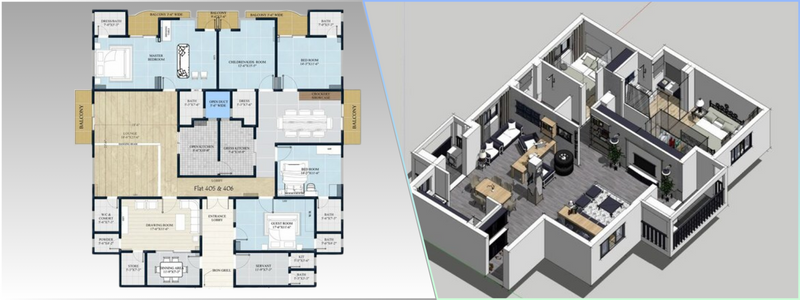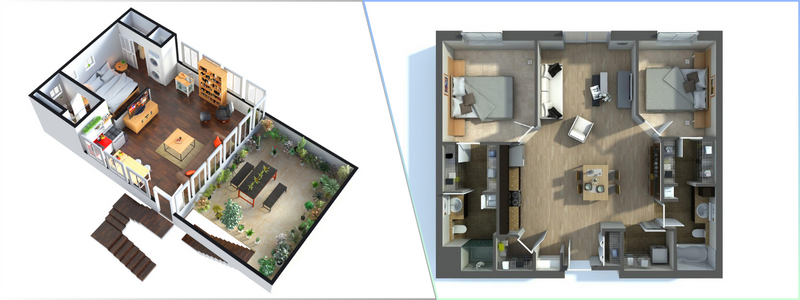Today’s post covers helpful information regarding 3D floor plan services and how to use a 3D floor plan effectively. Have you ever searched for a property to buy or rent? If so, you’ve probably noticed that many online property listings don’t just provide property descriptions and photos; they often include floor plan images. The floor plan typically portrays the size of the different rooms on the property. It may also include measurements of the length and width of each room. Through these depictions, even those who don’t belong or may not be familiar with the images can tell what kind of room it is and how the space can be used to the fullest.
But despite how handy floor plan images can be, they are not enough on their own. In those instances, 3D floor plan rendering services come in handy. 3D floor plan renderings are provided by 3D floor plan experts who can create detailed visualizations of floor plans that you can’t obtain from traditional floor plans. However, if this is your first time hearing about 3D floor plans, it is only natural that you have some continues. Continue reading this short beginner’s guide to using a 3D floor plan effectively:
 Table of contents
Table of contents
RELATED: Benefits of 3D floor plan rendering and design services for architects and companies
What are 3D floor plan renderings?
3D floor plan rendering is images that depict the structure (doors, windows, and walls) and the layout (furniture, fixtures, and fittings) of a home, office, building, or property in 3D. A 3D floor plan is often in color and displayed from a birds-eye view. While there are no stringent rules regarding the required angles of an image, top-down and isometric floor plans are the two styles most commonly used right now.
What makes 3D floor plans different from 2D floor plans?
2D floor plans are notably simpler than 3D floor plan renderings, often drawn in white and black, featuring additional details such as areas or dimensions. You may wonder when to use 2D floor plans or opt for 3D floor plans. Speak to a professional 2D drawings and floor plans design company about the appropriate solution. Your choice depends on the specific information you want to communicate and your objectives. A 2D floor plan might be better if your main priorities are facts, detail, and precision. For instance, a 2D drawing and floor plan design may be beneficial when applying for a building permit or providing dimensions to the building contractor.
Thanks to their simplicity, the 2D floor plan drawing process is faster, making them work great as a starting point or first draft for a project. Unfortunately, 2D floor plans can do little to convey a space’s look and feel, so you might need help visualizing the environment and getting a good sense of the atmosphere.
RELATED: Architectural symbols for 2D drawings and floor plans – how companies interpret them
A 3D floor plan rendering designer can add vibrancy to a property. They provide a quick, comprehensive view of the property’s layout, design, furniture, and colors. They are easy to understand at a glance, making them a valuable tool for selling off-plan properties or visualizing the potential of an empty house.
Who uses 3D floor plan designs?
Any individual or professional who wishes to convey and present more detailed information regarding a property and its layout can use and take advantage of 3D floor plan design services. These professionals include:
- Architects
- Bathroom fitters and designers
- Carpet and floor installers
- Construction contractors
- Event organizers
- Fire safety and building security professionals
- Furniture salespeople
- Interior designers
- Kitchen designers
- Landscapers and garden planners
- Property photographers
- Property sales websites
- Real estate agents
- Home renovators and builders
- Window and door installers
RELATED: Why companies are choosing 3D floor plan rendering to design and visualize projects

3D floor plan design elements
Before you learn why and how to create 3D floor plan designs, you need to know the essential elements of 3D floor plan design. Some of these are the following:
- Doors
- Partitions or walls
- Windows
3D floor plan designs should also include anything in the mood board, such as:
- Accessories
- Appliances
- Carpeting or rugs
- Hardware or fixtures
- Flooring
- Furniture
- Lighting
After you have identified the details of the essential floor plan elements above, you can now move forward with the importance of creating 3D floor plan designs.
RELATED: How do 3D interior design rendering services use space planning for floor plans?
Why create 3D floor plan design?
As the saying suggests, a picture can convey a wealth of information, and the same applies to 3D floor plan designs and 3D floor plan renderings. With a 3D floor plan design, you can visualize designs and ideas more effectively and quickly than with verbal instructions, written descriptions, or even 2D floor plans.
Below are some of the best reasons why you should create 3D floor plans and take advantage of professional 3D floor plan design services:
Prevent costly mistakes
That elegant king-sized bed may have seemed magnificent in the showroom, but if it dominates your bedroom to the extent that you must squeeze against the wall to access it, its stylish allure can quickly diminish. With a 3D floor plan design, you will know the exact amount of available space you have and the possible impact of large furniture pieces on the overall aesthetics of a room.
RELATED: Designing small house floor plans: rules for contractors & companies to follow
Communicate ideas easily
If you have the most fantastic idea for renovating your kitchen, and your partner needs help grasping the concept, you can help them visualize the design through the help of 3D floor plans and 3D architectural visualization firms. While there might be no guarantee that your partner will agree with what you have in mind, you can be sure that you will be on the same page at least.
Compare various designs
After you have developed a design template, it is time to unleash your imagination and creativity. Whether you wish to update the color of the wall, mix the layout of the furniture pieces, or check the appearance of an extra large sofa on the corner, a 3D floor plan design will help you quickly assess your options.
Showcase the property in its best light
People’s attention spans have become shorter than ever, especially in this modern world of marketing and sales. With the help of 3D AR/VR architectural services (another type of floor plan), you can be sure your message will be delivered efficiently and quickly without making anyone feel bored and sleepy. This makes 3D floor plans ideal for property listing websites and real estate agents, especially those who sell off-plan houses.
RELATED: How AEC companies can leverage VR and AR simulations in architectural design

Unleash creativity
The simple act of using 3D floor plan design services can significantly help during the design process. If you are running out of ideas or need help finding inspiration, a 3D floor plan design will have those ideas flowing quickly.
How to create effective 3D floor plan designs
Here are the basic steps that 3D floor plan design services follow when preparing 3D floor plans for their clients:
1. Choose a medium for a 3D floor plan design
3D floor plan rendering services begin by selecting software tailored to the client’s needs and project requirements before drawing and measuring the floor plan.
2. 2D drawings and floor plans
Most floor plans start as 2D drawings. Manual drawings can be done by hand depending on the software or 2D drawings and floor plan design services used. These will then be uploaded, or the 2D drawings and floor plans can be made in the software program. The 2D floor plan drawings designer or 3D floor plan designer will also take care of the necessary physical measurements beforehand to ensure the exact dimensions of the space.
They will also add other critical room elements like doors, windows, and walls at this stage for the drawing to accurately reflect the space as much as possible. After all these, the 2D drawings will be ready to be converted into 3D using special software.
RELATED: How architectural companies design 3D floor plans for residential home design
3. Include furnishings
Once the 3D floor plan rendering is made, furnishings can be added to bring the design to life. The 3D floor plan can be decorated and furnished similarly in real life. It is also the time to include flooring or lighting, wall paint, and furniture.
4. Cross-reference the mood board
As the 3D floor plan designer adds final touches and furnishings to the 3D floor plan rendering, they consult the mood board to align with your vision for the space. If elements in the mood board can’t be fully represented in the 3D space, the designer can refer to it when presenting the design to clients to convey its complete potential. For the finest 3D floor plans, choose the best 3D floor plan design services for your projects!
How Cad Crowd can help
Ready to elevate your project design and visualization with 3D floor plan rendering? Cad Crowd offers top-notch 3D rendering services that bring your architectural visions to life. Our experienced team of freelance designers and modelers will help you create stunning, realistic 3D floor plans that captivate clients and streamline your design process.
Contact us today for a free quote and discover how 3D floor plan rendering can transform your projects into visual masterpieces.
